In a significant move to empower Small and Medium Enterprises (SMEs) navigating the lucrative global Halal market, Hong Leong Islamic Bank (HLISB) has introduced BizHalal. This innovative, Shariah-compliant banking solution is designed to provide both financial support and Halal advisory services, aligning with Malaysia’s strategic vision to expand its Halal ecosystem.
What is BizHalal?
BizHalal is more than just a financial product; it’s a partnership between HLISB and the Halal Development Corporation (HDC), solidified through a recent Memorandum of Understanding (MOU). This collaboration underscores HLISB’s dedication to fostering growth and development within the Halal industry.
Strategic Goals and Historical Context
HLISB CEO, Dafinah Ahmed Hilmi, reflected on the bank’s ongoing commitment to the Halal sector since 2018 and expressed enthusiasm about how BizHalal will further stimulate the expansion of local Halal SMEs. The service package includes tailored financing solutions and expert advisory services, ensuring businesses are well-equipped to thrive in this dynamic market.
Market Potential and Economic Impact
The global Halal market, valued at USD 3 trillion in 2020, continues to grow, with projections placing Malaysia’s Halal industry at US$113.2 billion by 2030. Despite this potential, a gap remains between the market demand and supply, highlighting the critical need for increased investment and collaboration to tap into this burgeoning sector.
Partnership Impact
HDC Chairman, Khairul Azwan Harun, emphasized the importance of strategic partnerships like that of HLISB and HDC in closing the market gap and cultivating local Halal champions. These collaborations are pivotal in ensuring the sustainability and global competitiveness of Malaysia’s Halal SMEs.
Technological Integration
Acknowledging the role of technology, HDC has introduced the Halal Integrated Platform (HIP), which simplifies the certification process and enhances the operational efficiency of Malaysia’s Halal ecosystem. This digital approach not only streamlines operations but also broadens the accessibility of Halal certification for SMEs.
Support and Advisory Services
Under BizHalal, HLISB’s Halal Industry Specialists provide comprehensive support to customers. This includes a readiness assessment, advisory assistance, and integration into the Halal Digital Ecosystem. These services are crucial for both existing Halal-certified businesses and new entrants aspiring to obtain certification.
Inclusivity and Accessibility
BizHalal is accessible to all HLISB customers, supporting both current Halal-certified businesses and those seeking to achieve certification. Additionally, customers who avail of HLISB’s business financing facilities will automatically qualify for the BizHalal program, making it easier for SMEs to join and benefit from this initiative.
With the introduction of BizHalal, HLISB reaffirms its commitment to supporting the growth of SMEs in the global Halal market. This initiative not only aligns with Malaysia’s economic goals but also serves as a catalyst for the development of a robust, sustainable Halal ecosystem that can lead on the international stage.
This rewrite not only incorporates the key phrase “HLISB Introduces BizHalal To Support SMEs in the Global Halal Market” effectively for SEO but also enhances the article’s relevance and informative nature, making it more engaging for readers interested in Islamic finance and the Halal industry.




















